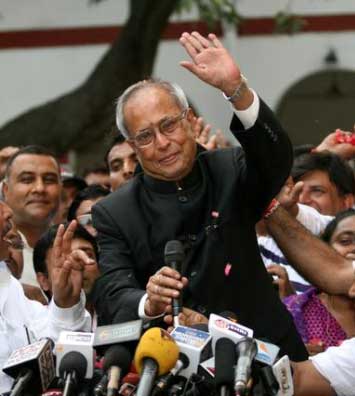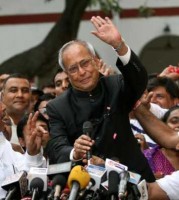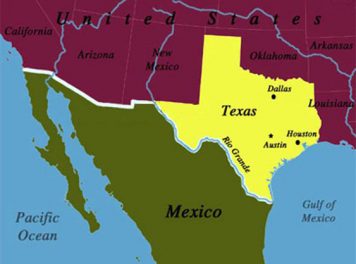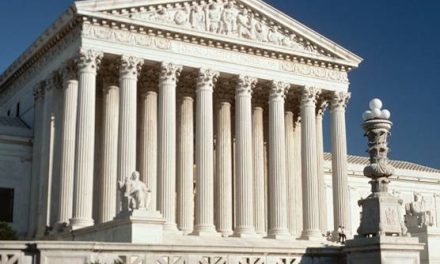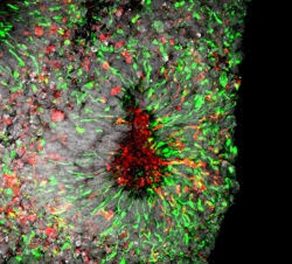By Hindustan Times
NEW DELHI, July 23, 2012 – Pranab Mukherjee was elected yesterday the President of India, trouncing PA Sangma by a huge margin to embark on a new journey capping over four decades of active political innings.
In a virtually one-sided election that saw divisions in the opposition NDA, the 76-year-old UPA nominee Mukherjee secured a vote of 713,763, garnering 69.3% of the total 1,029,750 valid votes polled.
Rival Purno Sangma, who was backed by BJP and some other opposition parties like AIADMK and BJD, trailed far behind with 315,987 vote value in the polling that saw heavy cross-voting against him by BJP MLAs in Karnataka in favor of Mukherjee.
“I declare that Shri Pranab Mukherjee has been duly elected to the office of President of India,” Returning Officer and Rajya Sabha Secretary General K Agnihotri announced after more than seven hours of counting that went on expected lines.
A veteran of politics and the art of governance, Mukherjee brings a wealth of experience to the top Constitutional office, having held various key positions in the party and government at the Centre.
A troubleshooter for the UPA till recently, Mukherjee will be sworn-in as the 13th President on July 25.
In brief comments after being elected, Mukherjee pledged to “protect, defend and preserve” the Constitution. “I will try to justify in a modest way as I can to be trustworthy.”
He said he was overwhelmed by the support he got from people, not limited to the electoral college comprising MPs and MLAs. “I have received much more from the country, its political establishment and Parliament than what I have given.”
Congratulations poured from all over with Prime Minister Manmohan Singh, Congress President Sonia Gandhi, Rahul Gandhi and senior Ministers making a beeline to his 13 Talkatora Road residence to greet him. Vice President Hamid Ansari also called to congratulate him.
Sangma, a former Lok Sabha Speaker who split from his party NCP to contest the election, congratulated Mukherjee and wished him success.
However, he alleged that the election was “exceptionally partisan” as the UPA lured states with “packages, inducements and threats.” He did not rule out moving court on the election.
Pranab gets overwhelming support of MPs
Mukherjee, who defeated Sangma by a margin of 397,776 vote value, established a clear lead throughout the counting of 4,659 votes polled by MPs and MLAs, out of which 4,578 were valid.
Out of 748 MPs, who had voted, he secured 527 votes with a value of 373,116 against 206 for Sangma which has a value of 145,848.
Fifteen votes were invalid, besides that of SP chief Mulayam Singh Yadav which was declared as cancelled. Of the invalid votes, nine were to be in favour of Mukherjee while six for Sangma.
Each MP has a vote value of 708. There are a total of 776 voters in both the houses of Parliament.
The electoral college consists of 4,120 MLAs in the states.
In Andhra Pradesh, which has a 294-member Assembly, Mukherjee got the support of 182 MLAs including that of Congress and YSR Congress while Sangma got the backing of three. Five were invalid.
In terms of vote value, Mukherjee got 26,936 while Sangma 444. A total of 190 MLAs voted because TDP and TRS abstained. Each MLA in Andhra Pradesh has a vote value of 148.
Mukherjee kept up his lead even in the northeastern state of Arunachal Pradesh, where he got 54 of the 59 votes polled. The vote value corresponded to 432 for Mukherjee, while it was 16 for Sangma.
Pranab’s sister predicted he will be President
In the states too, Mukherjee established a clear lead except in BJP-ruled states. But the ruling BJP suffered a humiliation in Karnataka when Mukherjee got 117 votes against BJP’s 103 in the 224-member Assembly.
In Kerala it was a clean sweep for Mukherjee as won all the 124 votes polled while one was invalid. Sangma drew a blank. CPI and RSP members abstained from voting which has a 140 member Assembly.
In Andhra Pradesh, which has a 294-member Assembly, Mukherjee got the support of 182 MLAs including that of Congress and YSR Congress while Sangma got the backing of three. Five were invalid.
In terms of vote value, Mukherjee got 26936 while Sangma 444. A total of 190 MLAs voted because TDP and TRS abstained. Each MLA in Andhra Pradesh has a vote value of 148.
Mukherjee kept up his lead even in Arunachal Pradesh, where he got 54 of the 59 votes polled. The vote value corresponded to 432 for Mukherjee, while it was 16 for Sangma. Three votes were invalid.
In the 126-member Assam Assembly, Mukherjee got 110 votes while Sangma got 13. Two votes were invalid while one did not vote. In terms of vote value, Mukherjee got 12,760 while Sangma got 1,508.
In Bihar too, where the ruling JD(U) has declared support for Mukherjee, the UPA candidate got 146 out of the 240 votes polled in the 243 member Assembly. Sangma got 90, mostly from BJP, which shares power with JD(U).
Mukherjee’s vote value in in the state was 25,258 while for Sangma it was 15,570. Three votes were invalid while one did not vote.
In the 90-member Assembly Chhattisgarh which is ruled by BJP, 39 votes went to Mukherjee while Sangma got 50. One vote was invalid. In terms of vote value, Mukherjee got 5,031 while Sangma got 6,450.
Mukherjee got 59 votes and Sangma 123 votes in 182-member Gujarat Assembly where BJP has the majority. In terms of vote value, Mukherjee got 8,673 while Sangma got 18,081.
In 81-member Jharkhand Assembly, Mukherjee got 60 votes while Sangma won 20. Mukherjee’s vote value is 10560 while Sangma’s stands at 3,520.
A new journey for Mukherjee
Mukherjee, 76, a ruling Congress party loyalist, was the overwhelming favourite for the post of head of state after drawing broad support over rival Purno A Sangma, 64, a former Speaker of Lok Sabha.
The President is chosen by 4,896 state and parliamentary lawmakers and Mukherjee’s success would mark a welcome victory for the embattled Congress, which is struggling with a string of graft scandals and a slowing economy.
India needs Pranab as president: Sharad Yadav
Famously just five-feet (152 centimetres) tall, Mukherjee — who uses a stool to be seen over podiums — has long been Congress’s firefighter, leaving many wondering how the party will cope without its “political Mr Fixit.”
But analysts say he may be called on to play an even more influential role as President. Under the Constitution, the Prime Minister wields most of the executive power but the President can play a vital part in forming governments.
Mukherjee, who resigned as finance minister to seek the presidency, could “be the kingmaker,” said analyst TK Tripathi.
With the upsurge of regional parties in an increasingly fractious political landscape and the possibility of a hung Parliament after the 2014 elections, he could have a pivotal role in deciding the next government, analysts say.
“It’s in this turbulent scenario Mukherjee as a President will be able to steer the ship of the state. He’s a troubleshooter,” said Sanjay Kumar, analyst at India’s Centre for the Study of Developing Societies.
Congratulations poured in from across the country for Pranab Mukherjee over his victory in Presidential poll, with leaders expressing the hope that the nation will achieve greater heights during his tenure in Rashtrapati Bhawan.
West Bengal chief minister Mamata Banerjee, who had kept everyone in suspense over supporting Mukherjee till the last minute, was among the first to call him. The chief minister told PTI that she had spoken to Mukherjee over telephone after his victory over P A Sangma.
Banerjee, who had in a U-turn announced the support of Trinamool Congress for him just two days before the July 19 election, said she had agreed to his request to attend his swearing-in ceremony.
Jammu and Kashmir chief minister Omar Abdullah, whose National Conference had supported Mukherjee, expressed hope that he will visit the state soon.
“We are sure he will be a great President and the nation will benefit from the vast experience that he has gathered over his long and illustrious career.
“We look forward to receive him in Srinagar when he comes to see the tulips,” Omar said.
About 95% of the total 4,896 electors – 776 MPs and 4,120 assembly members – exercised their franchise at the polling centres set up at Parliament House and 30 other state and union territories with assemblies.
Mukherjee bagged the support of the United Progressive Alliance constituents such as the Congress, Nationalist Congress Party, Trinamool Congress, DMK, and National Conference, apart from supporting parties such as the Samajwadi Party, Bahujan Samaj Party, Rashtriya Janata Dal and others.
He also got the support of opposition National Democratic Alliance members such as the Shiv Sena and the Janata Dal-United and other smaller parties such as the YSR Congress in Andhra Pradesh.
His rival Purno Sangma, supported by Bharatiya Janata Party, Shiromani Akali Dal, Asom Gana Parishad, AIADMK and Biju Janata Dal, is expected to garner about 313,000 votes.

